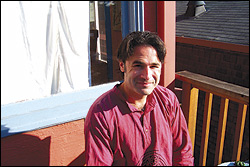In 2003, Dahr Jamail, 36, left his comfortable existence as a mountain guide and freelance writer in Anchorage to go to Baghdad and become one of America’s only unembedded journalists in Iraq.
From that perch, Jamail, who holds forth in The Nation and on Democracy Now! and www.dahrjamailiraq.com, has built an alternative-media following for his willingness to report from the street and go beyond the pronouncements of the U.S. military and provisional Iraqi government. What he’s seen has been both harrowing and disturbing. In 16 months, his ability to travel outside Baghdad has been severely curtailed, and his work in Baghdad has become infinitely more treacherous.
“I used to have long hair,” says Jamail. “I cut all my hair off so that I had an Iraqi short haircut. I grow a beard when I’m there, I wear local clothing, don’t talk English in public. I only go around with my interpreter, just the two of us, and we go around in a beat-up car, leave the hotel at different times every day, take different routes when we do, drive around a while to make sure we’re not being followed, then typically just go straight to where we’re going to conduct the interview.”
I asked Dahr why mainstream American media coverage of Iraq was so bad. He laughed. “There’s numerous reasons, from what I’ve seen. The first is that most mainstream reporters from the U.S. don’t go out on the streets. They only embed, and they only essentially report the military side of the story. If they don’t go out, they force themselves into this position where the brunt of their information is provided by the Pentagon.
“Another reason is because of this climate, this culture, that has been created in the mainstream where everyone reports the same thing. If they don’t report on the story that everyone else is reporting on, then I guess they feel like they’re going to miss out or something. So they’re not reporting on a variety of stories that are actually going on.
“Of course, really the primary reason is they’re just not doing journalism. They’re taking the information provided by the Pentagon and by the Bush administration, and they’re not questioning it. They’re citing these sources, and considering them irrefutable official sources just because they’re in the government, when the reality is a journalist’s job is to hold the government to account. They’re just simply not doing their job.”
For Jamail, the biggest misconception he encountered upon his return to the U.S. in February was that, after the election, things are getting better. “The elections were completely illegitimate,” he says. “The books were cooked. There’s really not considered to be any legitimacy in the [Iraqi] government. Everyone is simply jockeying for position and working with what they have to try to get what they want by these means that have been set out—for example, through this election and this national assembly. If that doesn’t give them what they want, that’s when the potential for civil war really starts to become a reality.”
Jamail fears that civil war is very much a threat, particularly if the Kurds demand independence—something Turkey won’t abide. The complex interrelationships of all the different ethnic groups and political powers are generally ignored, Jamail says, in American coverage of the conflict.
In terms of staying informed, Jamail suggests that Americans use alternative media: Democracy Now!, Free Speech Radio, Pacifica Radio; then use the Internet to read foreign news sites, for example The Guardian or The Independent in the U.K. Even Reuters does a better job than U.S. sources, and Al-Jazeera’s English Web site does a pretty good job of keeping up with daily events on the ground.
“And really, just about any other foreign media aside from ours is doing a much better job of covering the situation,” he says.
Jamail went to Iraq because of his personal frustration with media coverage here and his frustration with the Bush administration lies used to sell the war—lies often reported without question by media. Now, 16 months later, he sounds discouraged about the future of Iraq. Civil war is at hand, the administration is refusing to take steps to withdraw and thus quell the bloodshed, and the American public, he feels, is powerless to do much about it.
“We saw millions of people in the streets opposing the war. We see now so many people acknowledging the fact that Iraq is a disaster—not going well and probably not going to improve anytime soon. I don’t really know what the answer is. This administration is obviously not reflecting the will of the people, and so what tools are left for people to work with to force their government to act according to the will of the people?
“We’ve seen all of the other channels used—writing letters to senators, writing letters to the editor, demonstrations; none of this works. What’s left to do?
“I don’t really know the answer to that.”







